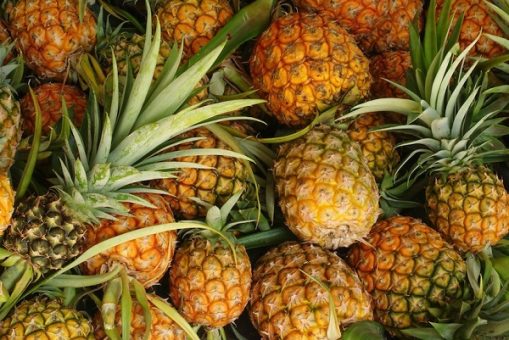
Nigeria loses a whopping N50 million daily to the importation of pineapples despite producing about 1,607,200 metric tons per annum, placing the country as the eighth largest producer of the crop in the world, an Agriculturist, Amb. Oluwasegun Alabi has said.
Addressing a news conference at the National Assembly on Monday, August 26, Alabi said that despite its comparative advantage, the country was importing pineapple from Ghana and Togo ranked as the 13th and 16th producer of pineapple in the world by the Food and Agricultural Organisation.
He said Nigeria was only able to meet 50 percent of its pineapple needs annually, adding that despite the high demand for Pineapple from Asian countries, Nigeria has not been able to produce enough to meet the demand.
He said further that the pineapple being cultivated in Nigeria does not meet the required standard for industrial use because the farmers failed to comply with good agricultural practices resulting in subpar fruit quality which makes them unsuitable for export and industrial use.
He said further that without proper processing facilities to package pineapples, Nigerians cannot export value-added products such as canned pineapples and pineapple concentrated juice thereby leaving the country out of the global market.
Alabi who is the Chief Executive Officer of Davidorlah Farms said Pineapple is the 5th most consumed fruit in the world, and holds a unique position as one of the luxury produce items in the global market, adding that the demand for pineapples consistently exceeds the supply, making it a highly lucrative crop.
He said further that despite the growing global demand for pineapples, Nigeria’s agricultural sector is yet to fully tap into this opportunity. One of the key challenges is the inconsistency in the quality of produce, stemming from outdated farming practices, stressing that many Nigerian farmers lack access to modern knowledge, resources, and infrastructure required to meet international standards.
He explained that discovery has unveiled the incredible versatility of pineapples, revealing that they can be used to produce a variety of items such as clothing, shoes, bags, disposable plates, spoons, and even biofuel. Coupled with the well-known health benefits of pineapples. All these factors have made the demand for pineapple in the world increase immensely.
He said: “With vast, fertile land, Nigeria has the potential not only to meet its domestic pineapple demand but also to become a leading global exporter. However, despite favourable climatic conditions, Nigeria has struggled to position itself as a key player in the international pineapple market.
“Instead, the country continues to import pineapples and related products, missing out on potential export revenue and global trade opportunities. Nigeria’s inability to capitalize on its pineapple production can be traced to several key challenges.
“We urge the government to create an enabling environment that fosters business growth and allows the private sector to thrive. To further address the pressing issue of the food security crisis in Nigeria, it is essential for the government to further engage the right people in the agricultural sector- individuals, and organizations with proven track records and a deep understanding of the industry, who can offer informed and strategic advice on how to solve these challenges with urgency”.
Credit: The Nation






